List of female scientists before the 20th century
This is a historical list, intended to deal with the time period where it is believed that women working in science were rare. For this reason, this list ends with the 20th century.
Antiquity

Marble herm in the Vatican Museums inscribed with Aspasia's name at the base. Discovered in 1777, this marble herm is a Roman copy of a 5th-century BC original and may represent Aspasia's funerary stele.
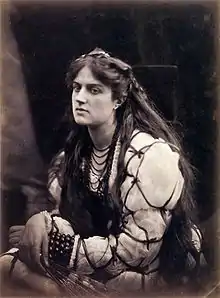
Hypatia by Julia Cameron
- Gargi Vachaknavi (7th century BCE), Indian philosopher
- Abrotelia (5th BCE), philosopher in Ancient Greece
- Aemilia (c. 300 CE–363 CE), Gallo-Roman physician
- Aesara of Lucania (4th or 3rd BCE), philosopher in Ancient Greece
- Agamede (12th century BCE), physician in Ancient Greece (possibly mythical)
- Aglaonike (2nd century BCE), first woman astronomer in Ancient Greece
- Agnodike (4th century BCE), first woman physician to practice legally in Athens[1]:2
- Andromache (mid-6th century), Egyptian physician[2]:39
- Amyte (300 BCE), Greek physician and poet[2]:40
- Arete of Cyrene (5th–4th centuries BCE), natural and moral philosopher, North Africa
- Artemisia of Caria (c. 300 BCE), botanist
- Asclepigenia (4th AD), Greek Neoplatonist[2]:55
- Aspasia (4th century BCE), philosopher and scientist
- Aspasia the Physician (fl. 1st century CE), Greek physician
- Axiothea of Phlius (fl. c. 350 BCE), Greek philosopher[2]:62
- Aurelia Alexandria Zosime, Ancient Roman physician [3]
- Beronice (1st AD), Roman philosopher[2]:118
- Caerellia (c. 45 BCE), Roman academician[2]:219
- Chun Yuyan (1st-century BC), Chinese obstetrician and gynecologist
- Clea (1st–2nd century AD), philosopher[2]:267
- Cleachma (5th century BCE), Greek philosopher[2]:267–68
- Cleopatra the Alchemist – wrote the alchemical book, Chrysopoeia, or "gold-making"[4]:99[5]
- Damo (6th century BCE), Greek natural philosopher
- Diotima of Mantinea (4th century BCE), philosopher and scientist, ancient Greece (sources vary as to her historicity; possibly a fictionalized character based on Aspasia of Miletus)
- Eccello of Lucania (5th or 4th century BCE), Greek/Italian mathematician and natural philosopher[2]:396
- Echecratia the Philiasian (5th century BCE), Greek/Italian mathematician and natural philosopher[2]:397
- Elephantis (1st century BCE), Greek physician
- Enheduanna (c. 2285–2250 BCE), Sumerian/Akkadian astronomer and poet
- Fabiola (died 399 CE), Roman physician
- Fang (first century B.C.), Chinese chemist
- Favilla (2nd century), Roman physician[2]:436
- Gu Bao (4th-century), was a Chinese physician
- Hypatia (370–415 CE), mathematician and astronomer, Egypt[1]:137
- Laïs, midwife[2]:735[6]
- Lais of Corinth, Ancient Greek physician [7]
- Lastheneia of Mantinea (5th century BCE), student of Plato
- Leontium (3rd BCE), Greek philosopher
- Leoparda (4th century AD), gynecologist
- Macrina (4th century AD), Greek physician and nun[2]:828
- Marcella (4th century AD), Roman healer[2]:841
- Mary the Jewess (1st or 2nd century CE), alchemist[4]:128
- Melissa (3rd century BCE), Greek philosopher
- Merit Ptah (c. 2700 BCE), Egyptian physician
- Metrodora (c. 200–400 AD), Greek physician and author
- Minucia Asste, Ancient Roman physician [8]
- Myia (5th century BCE), Greek philosopher
- Nicerata (c. 5th century), physician and healer
- Occello of Lucania (4th or 5th century BCE), Greek natural philosopher and mathematician[2]:957
- Olympias of Thebes (1st century BCE), Greek midwife[2]:962
- Origenia (2nd century AD), Greek healer[2]:965
- Pao Ku Ko (3rd-century A.D.), Chinese chemist
- Paphnutia the Virgin (c. 300), Egyptian alchemist[2]:978
- Paula (347–404 CE), Roman healer[2]:990
- Perictione (5th century BCE), Greek philosopher, mother of Plato
- Panthea, Ancient Greek physician, wife and colleague of Glycon. [9]
- Philinna of Thessaly, Ancient Greek physician [10]
- Peseshet Egyptian physician (Fourth Dynasty)
- Pulcheria (5th century AD), healer[2]:1059
- Pythias of Assos (4th century BCE), marine zoologist
- Restituta (1st-century), Ancient Roman physician [11]
- Salpe of Lesbos, Ancient Greek physician [12]
- Salpe (1st century BCE), Greek midwife
- Sotira (1st century BCE), Greek physician[2]:1217–18
- Tapputi-Belatekallim (First mentioned in a clay tablet dating to 2000 BCE), Babylonian perfumer, the first person in history recorded as using a chemical process[13]
- Terentia Prima, Ancient Roman physician [14]
- Theano (6th century BCE), philosopher, mathematician and physician
- Thelka, Iranian[2]:1278
- Theosebeia (4th century AD), healer[2]:1278
- Yi Jia (2nd-century BC), was a Chinese physician
Middle Ages
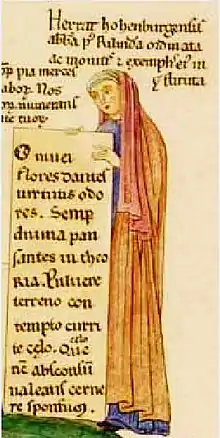
Herrad of Landsbert
- Abella (14th-century), Italian physician[15]
- Adelle of the Saracens (12th-century), Italian physician
- Adelmota of Carrara (14th-century), Italian physician
- Rufaida Al-Aslamia (7th-century), Muslim nurse
- Maesta Antonia (1386–1408), Florentine physician[15]
- Ameline la Miresse (fl. 1313–1325), French physician[15]
- Jeanne d'Ausshure (d. 1366), French surgeon[15]
- Zulema L'Astròloga (1190-after 1229), Moorish astronomer
- Brunetta de Siena (fl. 15th-century), Italian-Jewish physician[15]
- Hildegard of Bingen (1099–1179), German natural philosopher[1]:126
- Sibyl of Benevento, Napolitan physician specializing in the plague buboes[15]
- Constanza, Italian surgeon,[16] mentioned in Pope Sixtus IV edict regarding physicians and surgeons.[17]
- Denice (fl. 1292), French barber-surgeon[15]
- Demud (fl. ca. 13th century), German physician[18]
- Dobrodeia of Kiev (fl. 1122), Byzantine physician
- Dorotea Bucca (fl. 1390), Italian professor of medicine[15]
- Constance Calenda (15th-century), Italian surgeon specializing in diseases of the eye[19][16]
- Virdimura of Catania (fl. 1376), Jewish-Sicilian physician[15]
- Caterina of Florence (fl. 1400s), Florentine physician[15]
- Jeanne de Cusey (fl. 1438), French barber-surgeon[15]
- Antonia Daniello (fl. 1400), Florentine-Jewish physician[15]
- Clarice di Durisio (15th-century), Italian physician
- Fava of Manosque (fl. 1322), French-Jewish physician[15]
- Fatima al-Fihri (9th century), born in Tunesia, founder of world's first university in Fez (Morocco)
- Jacobina Félicie (fl. 1322), Italian physician
- Francesca, muller de Berenguer Satorra (15th-century), Catalan physician [20]
- Maria Gallicia (fl. 1309), licensed surgeon[15]
- Bellayne Gallipapa (fl. 1380), Zaragoza, Spanish-Jewish physician[15]
- Dolcich Gallipapa (fl. 1384), Leyda, Spanish-Jewish physician[15]
- Na Pla Gallipapa (fl. 1387), Zaragoza, Spanish-Jewish physician[15]
- Sarah de St Giles (fl. 1326), French-Jewish physician and medical teacher[15]
- Alessandra Giliani (fl. 1318), Italian anatomist
- Rebecca de Guarna (fl. 1200), Italian physician[19][16]
- Magistra Hersend (fl. 1249–1259), French surgeon
- Maria Incarnata, Italian surgeon,[16] mentioned in Pope Sixtus IV edict regarding physicians and surgeons.[21]
- Isabiau la Mergesse (fl. 1292), French-Jewish physician[15]
- Floreta La-Noga (fl. 1374), Aragonese physician[15]
- Helvidis (fl. 1176), French physician[15]
- Keng Hsien-Seng (10th-century), Chinese chemist
- Li Shao Yun (11th-century), Chinese chemist
- Stephanie de Lyon (fl. 1265), French physician[15]
- Guillemette du Luys (fl. 1479), French royal surgeon[15]
- Thomasia de Mattio, Italian physician,[16] mentioned in Pope Sixtus IV edict regarding physicians and surgeons.[22]
- Margherita di Napoli (late 14th-century), Napolitan oculist active in Frankfurt-am-Main[15]
- Mercuriade (14th-century), Italian physician and surgeon[19]
- Gilette de Narbonne (fl. 1300), French physician[15]
- Isabella da Ocre, Napolitan surgeon[15]
- Francisca da Romana, Napolitan physician[15]
- Dame Péronelle (1292–1319), French herbalist
- Peretta Peronne, also called Perretta Petone (fl. 1411), French surgeon[15]
- Lauretta Ponte da Saracena Calabria, Napolitan physician
- Trota of Salerno (fl. 1090), Italian physician[15]
- Marguerite Saluzzi (fl. 1460), Napolitan licensed herbalist physician[15]
- Sara de Sancto Aegidio (fl. 1326), French physician
- Juana Sarrovia (fl. 1384), Barcelona, Spanish physician[15]
- Shen Yu Hsiu (15th-century), Chinese chemist
- Sun Pu-Eh (12th-century), Chinese chemist
- Raymunda da Taberna, licensed Napolitan surgeon[15]
- Théophanie (fl. 1291), French barber surgeon[15]
- Trotta da Toya (f. 1307), Napolitan physician[15]
- Polisena da Troya (fl. 1335), licensed Napolitan surgeon[15]
- Margarita da Venosa (fl. 1333), licensed Napolitan surgeon,[15] who studied at the University of Salerno[23] She was considered a noteworthy practitioner and counted Ladislaus, king of Naples, as a patient.[24]
- Francisca di Vestis (fl. 1308), Napolian physician[15]
- Zhang Xiaoniang (11th-century), Chinese physician
16th century
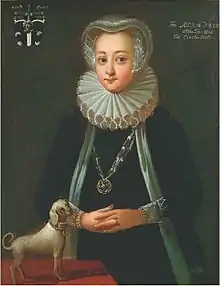
Sophie Brahe portrait
- Maria Andreae (1550–1632), German pharmacist
- Marie de Brimeu (1550-1605), Flemish botanist
- Sophia Brahe (1556–1643), Danish astronomer and chemist
- Isabella Cortese (fl. 1561), Italian alchemist
- Helena Magenbuch (1523–1597), German pharmacist
- Loredana Marcello (died 1572), Venetian botanist
- Tarquinia Molza (1542–1617), Italian natural philosopher
- Catherine de Parthenay (1554–1631), French mathematician
- Elinor Sneshell (fl. 1593), English surgeon
- Agatha Streicher (1520–1581), German phycisian
- Caterina Vitale (1566–1619), Maltese pharmacist and chemist[25]
- Tan Yunxian (1461–1554), Chinese physician
17th century
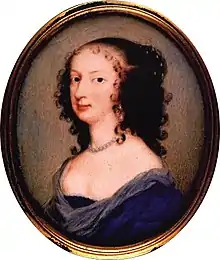
Margaret Cavendish
- Anna Åkerhjelm (1647–1693), Swedish traveler and archaeologist
- Ann Baynard (1672–1697), British Natural philosopher
- Aphra Behn (1640–1689), British translator of an astronomical work
- Martine Bertereau (1600–fl.1642), French mineralogist
- Agnes Block (1629–1704), Dutch horticulturalist
- Elisabeth of Bohemia, Princess Palatine (1618–1680), German natural philosopher
- Louise Bourgeois Boursier (1563–1636), French obstetrician
- Titia Brongersma (1650–1700), Frisian archaeologist, poet
- Margaret Cavendish (1623–1673), natural philosopher
- Marie Crous (fl. 1640), French mathematician
- Maria Cunitz (1610–1664), Silesian astronomer
- Jeanne Dumée (1660–1706), French astronomer
- Maria Clara Eimmart (1676–1707), German astronomer
- Marie Fouquet (1590–1681), French medical writer
- Eleanor Glanville (1654–1709), English entomologist
- Elisabeth Hevelius (1647–1693), Polish astronomer
- Maria Sibylla Merian (1647–1717), naturalist[1]:206
- Marie Meurdrac (c. 1610–1680), French chemist and alchemist
- Elena Cornaro Piscopia (1646–1684), Italian mathematician and the first female PhD
- Marguerite de la Sablière (c. 1640–1693), French natural philosopher
- Jane Sharp (fl. 1671), British obstetrician
- Justine Siegemund (1636–1705), German obstetrician
- Mary Somerset, Duchess of Beaufort (1630–1715), English botanist
- Elizabeth Walker (1623–1690), British pharmacist
18th century
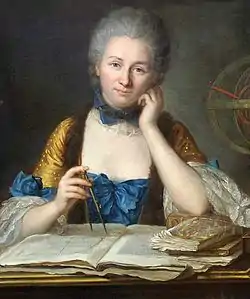
Portrait of Émilie du Châtelet by Maurice Quentin de La Tour
- Maria Gaetana Agnesi (1718–1799), Italian mathematician[1]:1
- Geneviève Charlotte d'Arconville (1720–1805), French anatomist
- Princess Charlotte of Saxe-Meiningen (1751–1827), German astronomer
- Maria Angela Ardinghelli (1728–1825), Italian mathematician and physicist
- Sarah Sophia Banks (1744–1818), British natural history collector
- Giuseppa Barbapiccola (c. 1702–1740), natural philosopher, translator
- Jeanne Baret (1740–1807), French circumnavigator and botanist
- Laura Bassi (1711–1778), Italian physicist[1]:20
- Marie Marguerite Bihéron (1719–1795), French anatomist
- Celia Grillo Borromeo (1684–1777), Italian natural philosopher
- Jacoba van den Brande (1735–1794), Dutch founder of first all-female science academy
- Maria Christina Bruhn (1732–1808), Swedish inventor
- Margaret Bryan (c. 1760–1815), British natural philosopher
- Elsa Beata Bunge (1734–1819), Swedish botanist
- Lydia Byam (fl. 1797–1800), naturalist
- María Andrea Casamayor (1700–1780), Spanish mathematician
- Émilie du Châtelet (1706–1749), French mathematician and physicist[1]:52
- Maria Medina Coeli (1764–1846), Italian physician
- Jane Colden (1724–1766), American biologist
- Rosalie de Constant (1758–1834), Swiss naturalist
- Angélique du Coudray (1712–1794), French midwife
- Maria Dalle Donne (1778–1842), Italian physician
- Eva Ekeblad (1724–1786), Swedish agronomist
- Dorothea Erxleben (1715–1762), German physician
- Charlotta Frölich (1698–1770), Swedish agronomist and historian
- Elizabeth Fulhame (fl. 1794), British chemist
- Lucia Galeazzi Galvani (1743–1788), Italian physician
- Sophie Germain (1776–1831), elasticity theory, number theory[1]:105
- Clelia Durazzo Grimaldi (1760–1830), Italian botanist
- Catherine Littlefield Greene (1755–1814), American inventor
- Salomée Halpir (1718-fl. 1763), Lithuanian oculist
- Caroline Herschel (1750–1848), German-British astronomer[1]:124
- Catherine Jérémie (1664–1744), French-Canadian botanist
- Christine Kirch (1696–1782), German astronomer
- Margaretha Kirch (1703–1744), German astronomer
- Maria Margarethe Kirch (1670–1720), German astronomer[1]:157
- Marie Lachapelle (1769–1821), French midwife
- Marie-Jeanne de Lalande (1760–1832), French astronomer
- Marie Paulze Lavoisier (1758–1836), French chemist and illustrator
- Nicole-Reine Lepaute (1723–1792), French astronomer
- Elisabeth Christina von Linné (1743–1782), Swedish botanist
- Martha Daniell Logan (1704–1779), American horticulturalist
- Eliza Lucas (1722–1793), American agronomist and indigo dye pioneer
- Maria Lullin (1750–1831), Swiss entomologist
- Catharine Macaulay (1731–1791), British social scientist
- Anna Morandi Manzolini (1716–1774), Italian physician and anatomist
- Marie Le Masson Le Golft (1750–1826), French naturalist
- Sybilla Masters (1675–1720), patent for a corn mill
- Lady Anne Monson (1726–1776), English botanist
- Maria Petraccini (1759–1791), Italian anatomist and physician
- Zaffira Peretti (fl. 1780), Italian anatomist and physician
- Claudine Picardet (1735–1820) French chemist, mineralogist and meteorologist
- Louise du Pierry (1746–1807), French astronomer
- Marie Anne Victoire Pigeon (1724–1767), French mathematician
- Faustina Pignatelli (1705–1785), Italian physicist
- Anna Barbara Reinhart (1730–1796), Swiss mathematician
- Cristina Roccati (1732–1797), Italian physics teacher
- Clotilde Tambroni (1758–1817), Italian philologist and linguistic
- Petronella Johanna de Timmerman (1723–1786), Dutch scientist
- Wang Zhenyi (1768–1797), Chinese astronomer
19th century
Anthropology
- Maria Czaplicka (1884–1921), Polish cultural anthropologist
- Alice Cunningham Fletcher (1838–1923), American ethnologist
- Johanna Mestorf (1828–1909), German prehistoric archaeologist
- Margaret Murray (1863–1963), British anthropologist
- Clémence Royer (1830–1902), French anthropologist
- Ellen Churchill Semple (1863–1932), American geographer
- Praskovja Uvarova (1840–1924), Russian archaeologist
Archeology
- Cornelia Horsford (1861– c. 1941), American archaeologist
- Lady Hester Stanhope (1776–1839), British archaeologist
- Zsófia Torma (1832–1899), Hungarian archaeologist, paleologist, anthropologist
Astronomy
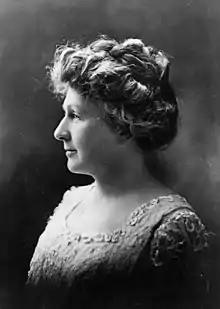
Annie Jump Cannon, 1922 Portrait
- Mary Albertson (1838–1914), American botanist and astronomer
- Annie Jump Cannon (1863–1941), American astronomer[1]:47
- Agnes Mary Clerke (1842–1907), British astronomer
- Florence Cushman (1860–1940), American astronomer
- Cecilia Payne-Gaposchkin (1900–1979), American astronomer and astrophysicist
- Williamina Fleming (1857–1911), Scottish/American astronomer[1]:89
- Margaret Lindsay Murray Huggins (1848–1915), British astronomer
- Henrietta Swan Leavitt (1868–1921), American astronomer[1]:170
- Annie Russell Maunder (1868–1947), Irish astronomer
- Antonia Caetana Maury (1866–1952), American astronomer[1]:195
- Maria Mitchell (1818–1889), American astronomer[1]:209
- Isis Pogson (1852–1945), British astronomer
- Caterina Scarpellini (1808–1873), Italian astronomer
- Sarah Frances Whiting (1846–1927), American astronomer and physicist[26]
- Mary Watson Whitney (1847–1921), American astronomer
- Anna Winlock (1857–1904), American astronomer
Biology or natural history

Mary Anning
- Frances Acton (1793–1881), British botanist
- Elizabeth Cary Agassiz (1822–1907), American natural historian
- Mary Albertson (1838–1914), American botanist and astronomer
- Mary Anning (1799–1847), British natural historian[1]:9
- Emily Arnesen (1876–1928), Norwegian zoologist
- Anna Atkins (1799–1871), British botanist
- Harriet Henrietta Beaufort (1778–1865), British botanist
- Isabella Bird Bishop (1831–1904), British natural historian
- Priscilla Susan Bury (1799–1872), English botanist
- Albertina Carlsson (1848–1930), Swedish zoologist
- Mary Agnes Meara Chase (1869–1963), American biologist
- Cornelia Clapp (1849–1934), American zoologist
- Anna Botsford Comstock (1854–1930), American natural historian
- Clara Eaton Cummings (1855–1906), American botanist
- Lydia Maria Adams DeWitt (1859–1928), American pathologist
- Mary Cynthia Dickerson (1866–1923), American herpetologist, museum curator and writer
- Amalie Dietrich (1821–1891), German natural historian
- Alice Eastwood (1859–1953), American biologist[1]:77
- Rosa Smith Eigenmann (1858–1947), American biologist
- Olga Fedtschenko (1845–1921), Russian botanist
- Maria Elizabeth Fernald (1839–1919), American entomologist
- Elisabetta Fiorini Mazzanti (1799–1879), Italian botanist
- Susanna Phelps Gage (1857–1915), American embryologist and comparative anatomist
- Lilian Jane Gould (1861–1936), British biologist
- Amelia Griffiths (1768–1858), British phycologist
- Marian E. Hubbard (1868–1956), American zoologist
- Agnes Ibbetson (1757–1823), English vegetable physiologist
- Susan Hallowell (1835–1911), American botanist
- Gabrielle Howard (1876–1930), British plant physiologist
- Ellen Hutchins (1785–1815), Irish botanist
- Ida Henrietta Hyde (1857–1945), American biologist[1]:135
- Maria Elizabetha Jacson (1755–1829), English botanist
- Alice Johnson (1860–1940), English zoologist
- Józefa Joteyko (1866–1928), physiologist, psychologist, pedagogist
- Josephine Kablick (1787–1863), botanist
- Helen Dean King (1869–1955), American biologist
- Phoebe Lankester (1825–1900), British botanist
- Marie-Anne Libert (1782–1865), Belgian botanist and mycologist
- Friederike Lienig (1790–1855), German-Baltic entomologist
- Elizabeth Eaton Morse (1864–1955), American mycologist/cryptogamist
- Katharine Murray Lyell (1817–1915), British botanist
- Helen Abbott Michael (1857–1904), American botanist and chemist
- Olive Thorne Miller (1831–1918), American natural historian
- Maria Gugelberg von Moos (1836–1918), Swiss botanist
- Margaretta Morris (1797–1867), American entomologist
- Mary Murtfeldt (1848–1913), American biologist
- Eleanor Anne Ormerod (1828–1901), British biologist
- Edith Marion Patch (1876–1954), American biologist
- Beatrix Potter (1866–1943), British mycologist
- Mary Jane Rathbun (1860–1943), American marine biologist
- Margaretta Riley (1804–1899), British botanic
- Caroline Rosenberg (1810–1902), Danish botanist
- Ethel Sargant (1863–1918), British biologist
- Hazel Schmoll (1890–1990), American botanist working on plant life in Colorado
- Lilian Sheldon (1862–1942), English zoologist
- Alexandra Smirnoff (1838–1913), Finnish pomologist
- Annie Lorrain Smith (1854–1937), British lichenologist and mycologist
- Emilie Snethlage (1868–1929), German-Brazilian naturalist and ornithologist
- Nettie Stevens (1861–1912), American geneticist[1]:284
- Jantina Tammes (1871–1947), Dutch botanist and geneticist
- Charlotte De Bernier Taylor (1806–1863), American entomologist
- Mary Treat (1830–1923), American naturalist
- Anna Vickers (1852–1906), marine algologist
- Jeanne Villepreux-Power (1794–1871), French marine biologist
- Anna Maria Walker (c. 1778–1852), Scottish botanist
- Elizabeth Andrew Warren (1786–1864), Cornish botanist
- Mary Anne Whitby (1784–1850), English breeder of silkworms
Chemistry

Ida Freund
- Vera Bogdanovskaia (1868–1897), Russian chemist[27]:64
- Ida Freund (1863–1914), first woman to be a university chemistry lecturer in the United Kingdom[27]:59–60
- Louise Hammarström (1849–1917), Swedish chemist
- Edith Humphrey (1875–1978), probably the first British woman to gain a doctorate in chemistry[28]
- Julia Lermontova (1846–1919), Russian chemist[27]:61–64
- Laura Linton (1853–1915), American chemist [27]:57–58
- Rachel Lloyd (1839–1900), American chemist [27]:55–56
- Adelaida Lukanina (1843–1908), Russian physician and chemist
- Helen Abbott Michael (1857–1904), American botanist and chemist
- Frances Micklethwait (1867–1950), British research chemist
- Muriel Wheldale Onslow (1880–1932), British biochemist
- Marie Pasteur (1826–1910), French chemist and bacteriologist
- Mary Engle Pennington (1872–1952), American chemist
- Agnes Pockels (1862–1935), German chemist
- Vera Popova (1867–1896), Russian chemist
- Anna Sundström (1785–1871), Swedish chemist
- Ellen Swallow Richards (1842–1911), American industrial and environmental chemist[1]:254[27]:51–54
- Margarete Traube (1856–1912), German-born chemist who lived in Italy
- Anna Volkova (1800–1876), Russian chemist
- Martha Annie Whiteley (1866–1956), English chemist and mathematician
- Nadezhda Olimpievna Ziber-Shumova (died 1914), Russian chemist
Engineers
- Emily Roebling (1844–1903), American civil engineer
- Lanying Lin (1918–2003), Chinese materials science
Geology
- Florence Bascom (1862–1945), American geologist[1]:18
- Etheldred Benett (1776–1845), British geologist
- Mary Buckland (1797–1857), British paleontologist and marine biologist
- Margaret Crosfield (1859–1952), British paleontologist and geologist
- Maria Gordon (1896–1939), Scottish geologist
- Mary Emilie Holmes (1850–1906), American geologist and educator
- Charlotte Murchison (1788–1869), Scottish geologist
- Elizabeth Philpot (1780–1857), British paleontologist
Inventors
- Tabitha Babbitt (1779–1853), American inventor and tool maker
- Mary Brush (fl. 1815), American inventor
- Martha Coston (1826–1904), American inventor
- Ellen Eglin (1849–fl. 1890), American inventor
- Caroline Eichler (1809–1843), German inventor, instrument maker and prostheses designer.
- Hanna Hammarström (1829–1909), Swedish inventor
- Mary Kies (1752–1837), American inventor
- Margaret E. Knight (1838–1914), American inventor, first woman awarded a U.S. patent
- Huang Lü (died 1829), Chinese optic inventor
Mathematics

Ada King, Countess of Lovelace (Ada Lovelace)
- Sofia Kovalevskaya (1850–1891), Russian mathematician (partial differential equations, rotating solids, Abelian functions)[1]:162
- Augusta Ada Byron Lovelace (1815–1851), British mathematician[1]:180
- Emilie Martin (1869–1936), American mathematician
- Florence Nightingale (1820–1910), British statistician and nurse
- Emmy Noether (1882–1935), German mathematician
Microbiology
- Alice Catherine Evans (1881–1975), American microbiologist
Medicine
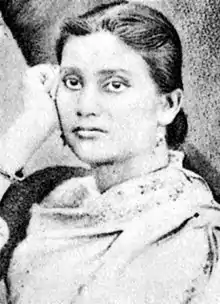
Kadambini Ganguly
- Rachel Alcock (1862–1939), British physiologist
- Elizabeth Garrett Anderson (1836–1917), British physician [1]:7
- Hedda Andersson (1861–1950), Swedish physician
- Lovisa Årberg (1801–1881), first woman doctor and surgeon in Sweden
- Amalia Assur (1803–1889), Swedish dentist
- Sara Josephine Baker (1873–1945), American doctor (child hygiene pioneer)
- Chandramukhi Basu (1860–1944), Indian physician
- Elizabeth Blackwell (1821–1910), American physician [1]:31
- Emily Blackwell (1826–1910), American physician
- Marie Boivin (1773–1841), French writer on obstetrics
- Elizabeth D. A. Cohen (1820–1921), American physician, first female physician in the state of Louisiana
- Rebecca Cole (1846–1922) American physician, by 1867 she was the second African-American woman to become a doctor in the United States
- Rebecca Lee Crumpler (1831–1895) American physician, by 1864 she was the first African-American woman to become a doctor in the United States
- Maria Dalle Donne (1778–1842), Italian physician
- Marie Durocher (1809–1893), Brazilian obstetrician, midwife and physician
- Enriqueta Favez (c. 1791–1856), Swiss physician and surgeon
- Rosalie Fougelberg (1841–1911), Swedish dentist
- Rupa Bai Furdoonji, Indian physician who was the world's first female anesthetist
- Kadambini Ganguly (1861–1923), Indian physician
- Johanna Hedén (1837–1912), Swedish midwife, feldsher and barber
- Aletta Jacobs (1854–1929), Dutch physician
- Maria Jansson (1788–1842), known as Kisamor, Swedish physician
- Sophia Jex-Blake (1840–1912), British physician
- Anandi Gopal Joshi (1865–1887), Indian physician
- Mary Poonen Lukose (1886–1976), Indian gynecologist
- Emmy Rappe (1835–1896), Swedish nurse
- Martha Ripley (1843–1912), American physician and suffragist
- Varvara Kashevarova Rudneva (1844–1899), Russian physician
- Florence R. Sabin (1871–1953), American medical scientist
- Ellen Sandelin (1862–1907), Swedish physician and teacher of physiology
- Regina von Siebold (1771–1849), German physician and obstetrician
- Charlotte von Siebold (1788–1859), German physician and gynecologist
- Anna Stecksén (1870–1904), Swedish pathologist
- Lucy Hobbs Taylor (1833–1910), American dentist
- Isala Van Diest (1842–1916), first female medical doctor and female university graduate in Belgium
- Catharine van Tussenbroek (1852–1925), Dutch gynecologist
- Mary Walker (1832–1919), American surgeon
- Karolina Widerström (1856–1949), Swedish physician
Nuclear physics
- Lise Meitner (1878–1968), Austrian, Swedish, nuclear physicist
Physics
- Hertha Marks Ayrton (1854–1923), British physicist[1]:14
- Mileva Einstein-Maric (1875–1948), Serbian/Swiss physicist
- Margaret Eliza Maltby (1860–1944), American physicist
- Mary Somerville (1780–1872), British physicist, polymath[1]:280
Psychology
- Mary Whiton Calkins (1863–1930), American psychologist
- Christine Ladd-Franklin (1847–1930), American psychologist[1]:167
- Margaret Floy Washburn (1871–1939), American psychologist
- Anna Freud (1895–1982), Austrian-British psychoanalyst
Science education
- Jane Webb Loudon (1807–1858), Writer of introductory gardening books
- Jane Marcet (1769–1858), Writer of introductory science books
- Almira Hart Lincoln Phelps (1793–1884), American science educator
- Josephine Silone Yates (died 1912), American chemistry professor
Sociology
- Jane Addams (1860–1935), American sociologist
- Charlotte Perkins Gilman (1860–1935), American sociologist
- Beatrice Webb (1858–1943), English sociologist and economist
See also
Notes
- Yount 2007
- Ogilvie, Marilyn; Harvey, Joy (2003-12-16). The Biographical Dictionary of Women in Science: Pioneering Lives From Ancient Times to the Mid-20th Century. Routledge. ISBN 9781135963439.
- Nathan J. Barnes: Reading 1 Corinthians with Philosophically Educated Women
- Ogilvie 1986
- Brown, James Campbell (1920). A History of Chemistry from the Earliest Times. P. Blakiston's Son & Company. pp. 19–24.
- Pliny the Elder, Natural History 28.81–84. Irby-Massie, 'Women in Ancient Science', in Woman's power, man's game: essays on classical antiquity in honor of Joy K. King, Bolchazy-Carducci Publishers, 1993. p.366
- Nathan J. Barnes: Reading 1 Corinthians with Philosophically Educated Women
- Nathan J. Barnes: Reading 1 Corinthians with Philosophically Educated Women
- Nathan J. Barnes: Reading 1 Corinthians with Philosophically Educated Women
- Nathan J. Barnes: Reading 1 Corinthians with Philosophically Educated Women
- Nathan J. Barnes: Reading 1 Corinthians with Philosophically Educated Women
- Nathan J. Barnes: Reading 1 Corinthians with Philosophically Educated Women
- Gabriele Kass-Simon; Patricia Farnes; Deborah Nash, eds. (1999). Women of science : righting the record (First Midland Book ed.). Bloomington, Ind.: Indiana Univ. Press. p. 301. ISBN 9780253208132.
- Nathan J. Barnes: Reading 1 Corinthians with Philosophically Educated Women
- L. Whaley: Women and the Practice of Medical Care in Early Modern Europe, 1400–1800
- Howard 2006
- Zahm, J.A. (1913). Woman in Science.
- Ogilvie, Marilyn; Harvey, Joy (2000). The Biographical Dictionary of Women in Science. New York: Routledge. p. 346. ISBN 0415920388.
- Walsh 1911
- «Diccionari Biogràfic de Dones: Francesca, muller de Berenguer Satorra»
- Zahm, J.A. (1913). Woman in Science.
- Zahm, J.A. (1913). Woman in Science.
- Howard, Sethanne (2007). "SCIENCE HAS NO GENDER: The History of Women in Science". Journal of the Washington Academy of Sciences. 93 (1): 1–15. ISSN 0043-0439.
- Zahm, J.A. (1913). Woman in Science.
- Hoe, Susanna (2016). "Valletta". Malta: Women, History, Books and Places (PDF). Oxford: Women's History Press (a division of Holo Books). pp. 368–369. ISBN 9780957215351. OCLC 931704918. Archived from the original (PDF) on 10 October 2016.
- "Sarah Whiting". CWP.
- Rayner-Canham & Rayner-Canham 2001
- Rayner-Canham, Marelene; Rayner-Canham, Geoff (23 Feb 2009). "Fight for Rights" (PDF). Chemistry World. 6 (3): 56–59.
References
- Byers, Nina. "Contributions of 20th Century Women to Physics". UCLA. Archived from the original on 1 August 2013. Retrieved 24 October 2013.
- Herzenberg, Caroline L. (1986). Women scientists from antiquity to the present : an index : an international reference listing and biographical directory of some notable women scientists from ancient to modern times. West Cornwall, CT: Locust Hill Press. ISBN 0-933951-01-9.
- Howard, Sethanne (2006). The hidden giants. Lulu.com. ISBN 978-1430300762.
- Howes, Ruth H.; Herzenberg, Caroline L. (1999). Their day in the sun : women of the Manhattan Project. Philadelphia: Temple Univ. Press. ISBN 1-56639-719-7.
- Ogilvie, Marilyn Bailey (1986). Women in science : antiquity through the nineteenth century : a biographical dictionary with annotated bibliography (3. print. ed.). Cambridge, Massachusetts: MIT Press. ISBN 0-262-15031-X.
- Ogilvie, Marilyn Bailey (2003). The Biographical Dictionary of Women in Science: Pioneering Lives From Ancient Times to the Mid-20th Century. Routledge. ISBN 9781135963422.
- Rayner-Canham, Marelene; Rayner-Canham, Geoffrey (2001). Women in chemistry : their changing roles from alchemical times to the mid-twentieth century. Philadelphia: Chemical Heritage Foundation. ISBN 978-0941901277.
- Stevens, Gwendolyn; Gardner, Sheldon (1982). The women of psychology. Cambridge, Massachusetts: Schenkman. ISBN 9780870734434.
- Walsh, James J. (2014). "VIII. Medieval Women Physicians". Old-Time Makers of Medicine The Students and Teachers of Medicine During the Middle Ages. Auckland: The Floating Press. pp. 150–169. ISBN 9781776530236.
- Yount, Lisa (2007). A to Z of Women in Science and Math (Rev. ed.). New York: Infobase Pub. ISBN 9781438107950.
External links
This article is issued from Wikipedia. The text is licensed under Creative Commons - Attribution - Sharealike. Additional terms may apply for the media files.
.jpg.webp)